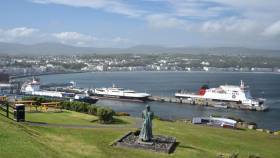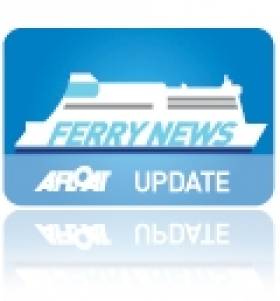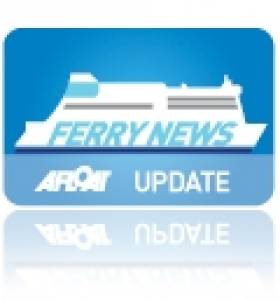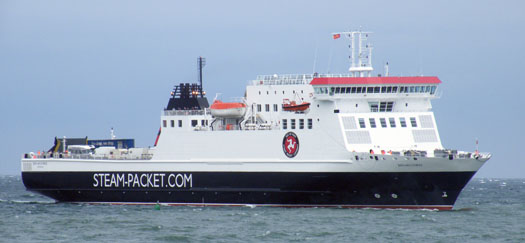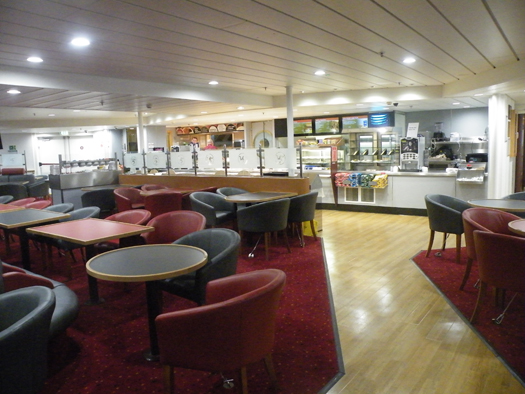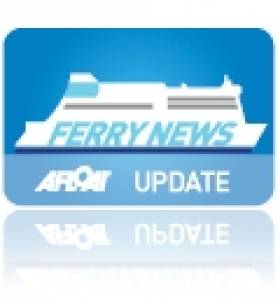Displaying items by tag: Steam Packet
Preparations By Isle of Man Steam Packet to Start Ferry Trials at New Liverpool Terminal
Preparations by the Isle of Man Packet Company reports 3FM are to see the ferry operator start trials and safety training at their new terminal in Liverpool.
The infrastructure built by a UK arm of the Irish contractor, John Sisk & Co as Afloat previously reported is located at Princes Half Tide Dock. The Department of Infrastructure is also working to ensure the berth will be ready for sea-trials to take place in early March.
This is to see the Steam Packet’s fast-craft, Manannan become the first vessel to berth at the new link-span which is less than a 1 km downriver of The Pier Head, the existing ferry terminal on Merseyside.
As long as such works can be put in place, the company expects the new terminal will be enabled to undertake Manannan’s mooring trials and familiarisation to be concluded towards the end of March.
According to the Steam Packet, the main priority is for Manannan to be in operation from Liverpool also at the end of the same month on the route to Douglas. Should it arise, a contingency plan will be put into effect for its first sailing to take place using the Pier Head terminal.
A fleetmate, flagship Manxman is also to make a debut at the new ferry facility for berthing trials in April, providing that everything goes according to plan. The flagship’s inaugural commercial call, however will be later in the year, when the terminal is scheduled for such sailings in November.
More here on the new Irish Sea terminal.
Isle of Man Questions Stack-Up at Steam Packet
#FerryNews - It may be the summer recess at the Tynwald, the Isle of Man's parliament, but questions are still being asked about the Steam Packet.
As IOMToday reports there are 12 separate questions surrounding the ferry company (see acquired by Manx Government) out of the 57 questions for written answer from Tynwald members.
Members can ask written questions during the recess, with responses due yesterday, August 21.
Of the 12, 11 questions come from Liberal Vannin leader, Kate Beecroft (Douglas South) with the other from Rob Callister (Onchan), both asking questions relating to the proposed Princes Half-Tide Dock.
Mr Callister’s question, for the Minister for Infrastructure Ray Harmer, relates to whether the current contract between Peel Holdings and the Steam Packet relating to access to Pier Head can be extended beyond the end of 2019 and what facilities will be in place from January 1 2020.
For much more on the story, click here.
Cancelled Irish Sea Fast-Ferry Sailings & Disruption on Isle of Man Route
#CancelledSailings – Met Eireann's marine weather foreceast currently has an 'orange' status warning of a gale in effect which has caused some cancellation of ferry sailings on the Irish Sea. In addition, the weather service has issued a 'yellow' warning for small craft.
The weather has caused cancellation of today's Irish Ferries high-speed craft Jonathan Swift operated sailings on the Dublin-Holyhead route. Passengers, however will be transferred to Ulysses conventional ferry sailings which continue to operate as normal. For latest information, click HERE.
Due to adverse weather conditions the Isle of Man Steam Packet Co.'s route between Douglas and Heysham have also led to cancelled sailings operated by the ro-pax ferry Ben-My-Chree. Todays 14.15 sailing from Douglas has been cancelled.
In addition further possible disruption may arise on the UK-Isle of Man link, on sailings later today and for tomorrow (Tuesday, 24 February), to consult latest information updates, click HERE.
Travellers are advised to check other ferry operators (listed below) for the latest sailing information updates.
For details of Met Eireann's coastal reports and conditions for sea crossing's forecast visit this LINK.
#FerryCaptainInterview - In our first of a series of interviews with Irish Sea ferry captains, Jehan Ashmore talks to Captain Allan Albiston, master of the Isle of Man Steam Packet Company's ro-pax ferry Ben-My-Chree, the Manx for 'Girl of My Heart'.
Captain Albiston's career has spanned more than four decades and his current command of the 600-passenger and vehicle ferry is principally employed operating the main link to the UK between Douglas-Heysham. In addition to running during the winter months to Birkenhead and on occasions of the seasonal-only service to Dublin Port.
Since entering service in 1998, the Dutch built ferry of 12,504 tonnes has been the workhorse of the company. She recently re-entered service fresh from an overhaul and refurbishment costing £1.6m to enhance passenger facilities and for those of her crew.
What first inspired you to thinking of having a career at sea?
My mother was born in the Isle of Man and so as a child I spent summer holidays on the island travelling by boat.
I spent my school summer holidays working on the rowing boats in Douglas and when I was old enough, as a steward on the last Ben-My-Chree between 1969 – 1971. Seven years later in 1978, I returned to the Steam Packet Company as a second officer.
Has there been an individual or seafaring background that has influenced your career?
My mother's family had fishing boats in Laxey during the early part of the 20th century so I guess it was in the blood somewhere.
What college did you attend?
I studied at the Fleetwood Nautical College.
The Isle of Man Steam Packet Company's ro-pax ferry Ben-My-Chree
The onboard Coast to Coast Cafe
What companies have you served and trading routes or regions?
For seven years served as as cadet and third officer with Andrew Wier (Bank Line) trading Worldwide to Africa, India, North & South America, Asia, Australia, New Zealand and Pacific Islands. Also had two winters with Manchester Liners trading to Montreal and to the Mediterranean Sea.
It was great fun seeing lots of the world in those years, but I wouldn't want to do it today. It's all about visiting container ports and oil terminals miles away from the city ports we used to visit.
Name the first ship that you took command?
The first vessel I took command of was the fast-craft ferry, Seacat Isle of Man.
What is your weekly routine in terms of managing crew operations of Ben-My-Chree?
The day to day running of crew operations is carried out by the heads of department, the Chief Engineer, Chief Officer and Passenger Services Officer – that look after their areas but as master, I am in overall charge of everything and everybody on board - it is all encompassing and ultimately I am responsible for all safety and crew training.
What aspects do you like serving on a multi-purpose ferry?
As Master, the vessel type is not as important as the route and schedule. The advantage of short sea routes means that regular leave periods, allows for a reasonably cohesive home life which is not enjoyed by mariners serving in deep sea trades.
What reasons make the ro-pax ferry suited to this short service on the Irish Sea?
It gives car and foot passengers an opportunity to travel from the Island twice a day 364 days a year which would not be possible with a split passenger / freight service.
Since her recent biennual overhaul, what has improved in terms of passenger facilities?
The main passenger lounge, the Coast to Coast Café, has been upgraded and is much brighter and airier giving a feeling of more space. The Legend's Bar area has also benefitted from new seating.
How many crossings does the ship make while working on the main link between the island and the UK mainland?
Apart from a routine maintenance night once a month and Christmas day, the vessel sails 28 crossings every week of the year, two in each direction daily.
Asides the Heysham-Douglas route, which seasonal operated route do you like to serve on across the Steam Packet network and why?
As senior master on Ben-my-Chree, the latest vessel to bear this famous 'steam-packet' name, I rarely do other routes apart from Birkenhead during the winter months.
People may not think there is much excitement sailing from Douglas to Heysham every day, with the occasional trip to Birkenhead, but there are lots of challenges.
Last winter we had atrocious weather, which was very challenging, and we sometimes have other problems to resolve as well as crew and customer issues to deal with on sailings, so there are plenty of challenges on a day-to-day basis.
When I was Master on the fast craft, which I commanded from 1997 until 2010, I liked the variety of operating different routes rather than having a specific favourite.
From a scenic perspective, the Belfast route was more interesting as we sometimes go south of the Isle of Man and sometimes north depending upon tidal conditions.
On leave, what are your favourite activities and pastimes?
I have a secondary occupation doing safety management for a large yacht company and this takes me to the Caribbean in winter and the Mediterranean in summer but I have also been to Australia and Brazil.
Travel abroad both for work and family holidays continues to be my favourite pastime with a couple of ski holidays thrown in.
Busier Times for Birkenhead
#Birkenhead – Busier times lay ahead for Birkenhead Twelve Quays Terminal next week when Stena Line introduce a third ship on the route to Belfast while today the Isle of Man Steam Packet resumed a winter service, writes Jehan Ashmore.
As previously reported Stena Line were set to launch the freight-only ferry earlier this week however bad weather and technical difficulties delayed the entry of Stena Hibernia (1996/13,007grt).
The 114-trailer freight-ferry will initially operate eight sailings per week. These extra sailings will depart Birkenhead Tues – Fri (at 0300hrs) and depart Belfast Tues – Fri (at 1500hrs). She will be sharing the double-linkspan berth at Birkenhead with the company's ro-pax sisters.
The Ben-My-Chree of the Isle of Man Steam Packet operates the weekend-only service from Douglas with a round-trip on Saturday's and this is repeated on Sunday's.The return of the ro-pax to the Mersey replaces fast-craft Manannan sailings between the Manx capital and Liverpool. Facing directly opposite is Birkenhead on the Wirral Peninsula.
Ben-My-Chree continues operating Douglas-Heysham weekday sailings on the route she has served as a reliable workhorse for the last 15 years. The Steam Packet are to charter the freight-ferry Arrow on the Manx-Cumbrian service in response to competition early next year from new operator Ellan Vannin Line.



























